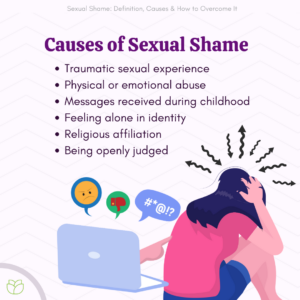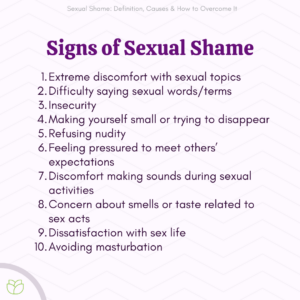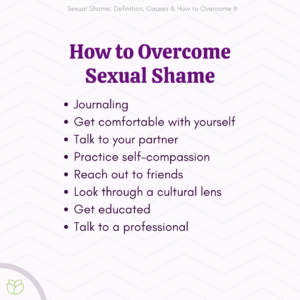Sexual shame is feeling wrong or bad about sexual acts, feelings, or desires. People are not born feeling sexually ashamed, rather some people learn along the way from negative messages, judgements, or poor/absent education. Sexual shame can be overcome. With self-acceptance, validation, and accurate and appropriate sex education, sexuality can be embraced and enjoyed.
Sex & Intimacy Counseling for Couples Receive online counseling in a safe, unbiased space from a licensed therapist. No need to go to an office. Visit Talkspace
What Is Sexual Shame?
When we believe something is so wrong with us that others will reject us, we feel shame. Sexual shame can encompass many aspects of sexuality, given that we rarely know what others are doing, thinking, or feeling when it comes to sex. Shame leads some people to keep things secret, which makes it hard for people and others around them to know how much we actually align with others.
Talking about sex is already difficult for many. Add identifying as part of the LGBTQIAA2+ community or not fitting stereotypes, and things can be even more challenging. Men may expect firm erections on demand and women may think screaming orgasms within two minutes are realistic, both of which may result in internalized shame. Sexual shame doesn’t mean we believe sex is bad, rather that a person believes something is wrong with our sexual selves.
Shame Resiliency Theory
Developed by Brenè Brown,1 the Shame Resiliency Theory (SRT) was established to uncover the tenets that comprise shame to understand how people can overcome it. This theory highlights the feelings of being trapped, powerless, and isolated because of shame. Trouble acknowledging feelings and difficulty being vulnerable often make it difficult to attain support that is desperately needed.
SRT holds that empathy is the opposite of shame and is best provided by a trusted other. Other important healing factors include connection, power, and freedom. These can be challenging regarding sexual shame as even the word “sex” can evoke shame feelings for some. Trusted others and a supportive community may be lacking or absent, allowing shame to thrive.
Causes of Sexual Shame
Sexual shame can arise from any experience in which we felt judged or faulty for our sexuality. Comments from peers, family, faith, and media can sometimes vilify very normal human experiences. Sex shaming has been used as a means of control by many cultures, leading to the evolution of purity culture that many continue to experience today.
Common causes of shameful feelings around sex include:
- Traumatic sexual experiences : Unwanted or traumatic sexual experiences can be difficult to talk about and may leave survivors feeling damaged or even to blame for the event. Being met with poor reactions from others significantly increases the experience of sexual shame.2
- Physical or emotional abuse: Abuse of any form, whether physical or emotional abuse , erodes safety, confidence, and sense of self, all of which are vital for healthy sexuality. If mistreatment focused on sexuality or one’s physical self, sex shame may result.
- Messages received during childhood: Being yelled at for self-exploration is one of many ways children may learn sexual shame. Young people are quick learners, and being scolded or threatened with disconnection (i.e. “no one will want you”) are quick ways to establish sexual shame.
- Feeling alone in identity : Wanting to belong is a basic need for most humans. Feeling alone in our identity or interests, or lacking representations of ourselves in the media can lead to internalized shame of sexual identity.
- Religious affiliation : Some faiths openly shame sex that is not intended for procreation. Values of chastity and the benefits of celibacy may be taught from a young age, instilling fear about engaging in any sexual act and causing shame for even thinking about them.
- Being openly judged: Comments such as “gross” and “disgusting” clearly convey judgment, as can a look or outright disengagement. Even if this comes from a stranger, it can be enough to instill or reinforce sexual shame.
Top Rated Online Therapy Services
BetterHelp – Best Overall
“BetterHelp is an online therapy platform that quickly connects you with a licensed counselor or therapist and earned 4 out of 5 stars.” Visit BetterHelp
Talkspace – Sex & Intimacy Counseling for Couples
Get closer to your partner with private and convenient counseling, from the comfort of your home. Visit Talkspace
Effects of Sexual Shame
Psychologically, ongoing feelings of shame can be difficult for anyone to bear. When these feelings center on sex and sexuality, being ok with oneself may become difficult. Concerns about sexuality may begin to intrude on daily thoughts. Anxiety may increase if there is a fear of being found out. As anxiety increases, so may the tendency to hide which can further fuel shame.
Relationships or sexual intimacy may be avoided, leading to increased feelings of depression and isolation. Talking with partners may be avoided for fear of losing connection. If sex continues despite these feelings, postcoital dysphoria might occur. Masturbation may be sought over connections with others, or sexual acts may be stopped all together.
Long-term effects of sexual shame may include:
- Feelings of anxiety: Anxiety or worry can center on rejection, judgment, or not being accepted. Sexual anxiety occurs when these feelings are mostly about sex, sexual intimacy, or sexual identity.
- Feelings of depression: Sustained or internalized feelings of any type of shame can have a negative impact on mood. When this persists for extended times and is accompanied by other symptoms, a depressive disorder may be present.
- Arousal or orgasmic difficulties: Focusing on pleasure and physical sensations becomes difficult when shame is present. Inability to become aroused or reach orgasm may further exacerbate shame, anxiety, and depression.
- Isolation: Strong feelings of sexual shame may inhibit open connections with others, leading to social and relational isolation. Some people choose to not engage rather than getting close to someone and possibly being rejected.
- Problematic sexual behaviors : People who experience sexual shame may continue to engage in sexual behaviors secretly or in excess as a means of avoiding uncomfortable feelings. This pattern can become cyclical, with the very behaviors that elicit feelings of shame being used to cope.
- Substance misuse or abuse: Coping with shame can be daunting, and some people may use substances in an attempt to numb. People who have experienced sexual trauma and then faced a negative reaction when disclosing are more likely to engage in problematic use.2
Signs of Sexual Shame
Sexual shame may not always be easy to detect. Many people have not taken the time to reflect on their sexual values to know how they feel about sex and sexuality, relying instead on messages from others. Subtle messages about sex can have a big impact over time and may be operating outside of awareness.
Below are common signs of sexual shame:
Extreme Discomfort With Sexual Topics
Shame is often accompanied with wanting to avoid the cause of the feeling. When shame is centered on sex, discussion of sexual topics may be highly uncomfortable. People might feel intense distress and try to leave the situation or change the conversation. Sexual scenes in movies or television may be avoided or endured with difficulty.
Difficulty Saying Sexual Words/Terms
Not everyone has access to healthy sex education. When this lack of knowledge is paired with feelings of shame around sex, it can be difficult to communicate about bodily functions or needs. Euphemisms or vague language such as “down there” may be used for genitals. “Intimacy” may be used for sex, which can be confusing when talking with partners.
Insecurity
With the root of shame centering on worthiness of connection, it holds that insecurity about sexual and intimate relationships would result from sexual shame. Constant concerns about being wanted, loved, or accepted may be prominent. Feeling the need to prove one’s value may drive actions. Concerns about being judged may override the ability to be present with a partner.
The need for ongoing reassurance can take a toll on a relationship. Even when validation and support are forthcoming, they are often insufficient to assuage the shame that exists. When a person doesn’t feel worthy of love and connection, contrary messages can be difficult to receive. The person offering support may get tired of their efforts not being enough, and the feared withdrawal of connection may come to fruition.
Making Yourself Small or Trying to Disappear
Avoiding eye contact, hunching shoulders, crossing arms, and generally trying to appear smaller are common postures when we feel shame. Crossing our arms in front of us protects our hearts and our sensitive middles. Some people may try to hide or disappear altogether. After all, if no one can see us, then no one can reject or hurt us.
Refusing Nudity
Being clothed is another form of protection from vulnerability, and one that often doesn’t align with sexual activity. Sexual shame can make it difficult to undress in front of others or be naked in the presence of someone else. Some may refuse to engage in sexual acts with lights on as the idea of being seen in the buff is too distressing.
Feeling Pressured to Meet Others’ Expectations
Consent is an important part of sex. Ideally both parties are enthusiastic about engaging in sexual activities. However, when someone doesn’t feel they can decline a sex act and maintain the relationship, this can become problematic. There may be a feeling of pressure to ‘perform’ sex in order to be accepted.
Discomfort Making Sounds During Sexual Activities
Sex can be noisy. From the sounds that come out of our mouths to the noises made by bodies and fluids moving around, auditory activity during sex is plentiful. When this isn’t expected or we have been made to feel shame about this, it may be difficult to stay present and engaged with pleasure when our bodies start making sounds.
Some people may be familiar with the sound air makes when being pushed out of a vagina. Known as a ‘queef’, some women feel responsible (and often ashamed) of this phenomenon. Given air is usually allowed in when a penis or other object is sufficiently removed to allow it, partners play a role in this phenomenon as well. Sounds are a natural part of sexual activity that both partners play a role in, and not something women should experience shame over.
Concern About Smells or Taste Related to Sex Acts
Similar to sounds, the senses of taste and smell are a part of sex. Engagement in oral sex (mouth on genitals or anus) can put us front and center with various smells and tastes. Some people may be so concerned with their natural scents being offensive that oral sex is outright refused, even if it’s enjoyed or preferred.
Dissatisfaction With Sex Life
Leaning into pleasure can be hard when there is so much mental attention being given to shame. Not being able to recognize its presence or lacking the words to describe it can lead to blaming other parts of one’s sex life for dissatisfaction. Sometimes the introduction of sex devices or pornography may be made to increase sexual satisfaction, when in fact shame is really the driving force of the dissatisfaction to address.
Avoiding Masturbation
Masturbation is common. Many people use it to feel good, relax, and the health benefits of masturbation even help with cramps! For people with sexual shame, masturbation can cause the person to feel guilt and is often avoided. It may bring up too many uncomfortable feelings to be worth the pleasure that may or may not result.
Sex & Intimacy Counseling for Couples Receive online counseling in a safe, unbiased space from a licensed therapist. No need to go to an office. Visit Talkspace
How to Overcome Sexual Shame
Even though sexual shame may feel overwhelming, there is a way through it. Having a solid set of coping skills will help deal with the feelings that will likely come up when working through this. It is important to process the origins of shame, evaluate sexual values, and choose with intention behaviors, thoughts, and feelings that are permissible for you.
Journaling
If we’re going to evaluate messages about sex for accuracy and utility, we have to first know what they are. Journaling for mental health is a good general practice and can be especially useful for sexual shame. When there aren’t established places to talk openly about sex, journaling can be an ideal place to start while maintaining a sense of safety.
Some helpful prompts to consider might include: What words do I associate with “sex”? What is the meaning of sex to me, and where did that come from? What permission have I been given around sex, pleasure, and my body? What do I need in place internally or externally to fully pursue pleasure? What am I worried may happen if I let loose sexually?
Get Comfortable with Yourself
Comfort with your sexual self is foundational for sharing experiences with others. Take a sensual shower with the goal of engaging your senses. Use a cleanser with a relaxing scent, play soft music, and light a candle. Touch your body slowly and intentionally, with the goal of simply being comfortable being naked and being touched. Focus on the sensations on your skin and breathe deeply. No one is there to judge.
As this becomes more familiar, consider moving on to masturbation. Appreciate your body’s ability to feel pleasure and respond naturally to stimulation. Focus your attention on the sensations you’re body experiences, imagining your nerve endings lighting up with touch. The goal of this exercise is not to orgasm, but to simply stay present. If this doesn’t feel good for you, it’s ok to stop. Shame can take time to unlearn.
Talk to Your Partner
Shame persists through secrecy and hiding. Talking openly with a partner can create space for validation and understanding. It can allow a partner to be aware of difficulties and provide specific support when it’s most needed. Knowing how to communicate in a relationship is fundamental. Many couples experience increased intimacy and closeness when conversations about sex are part of the repertoire.
Practice Self-Compassion
While empathy is most potent when received from others, showing empathy to ourselves can also help alleviate shame. Loving ourselves is not egotistical or selfish, it is imperative to being able to love others. Trusting that we are worthy of connection must be present for those connections to form.
Reach out to Friends
Try to remember you are not the only person who has these feelings. As Brenè Brown wrote, “we share in common what makes us feel the most apart.”1 Many people struggle with feelings of shame about sex. Try bringing up the topic in general to trusted friends (“hey, I read this article online, have you ever heard of this?”) to test the waters. Your friends may appreciate it as much as you!
Look Through a Cultural Lens
Shame has a way of making us feel that something is wrong with us. When we take a step back and widen the lens we’re looking through, we may find that our experience is connected to bigger themes. Reflecting on who created the expectations we’re struggling with and who actually benefits from them may help alleviate some personal responsibility.
Get Educated!
For many in the U.S., sex education focused solely on parts, plumbing, and disease. Little attention is given to pleasure, permission, and exploration. Take an adult sex education class or look for some good online resources to expand your knowledge. Gaining a better understanding of what’s ‘normal’ can neutralize a lot of self-judgment.
Talk to a Professional
Psychotherapy can be beneficial to most people at some point in life and usually involves talking individually with a professional about thoughts, feelings, and behaviors that may be impeding one’s life or well-being. Similarly, sex therapy is aimed at processing issues around sex and sexuality, exploring their origins, clarifying values, and assisting in making changes to improve happiness and satisfaction.
Finding the right therapist is pivotal, as change typically occurs in the context of a safe and trusting relationship. A sex therapist will create a non-judgmental space to allow for in-depth exploration of difficult issues and will work with you to create a plan for how to address aspects you want to see be different. In-person or online group therapy may provide additional support and opportunities to be safely seen by others.3
In My Experience
Shame sucks! Working as a Certified Sex Therapist in the south for more than a decade has put me face-to-face with sexual shame more times than I can count. I’ve sat with people who felt so ashamed of their bodies they wouldn’t even look at their genitals. I’ve worked with folks who thought they would never be loved because they had watched porn. But shame doesn’t have to come from extreme events and the results can be just as damaging.
It’s amazing to watch the change people experience when they are validated and supported. The shift in their posture and demeanor when they hear that nothing is wrong with them, that they’re not alone, and change is not only possible, but probable is among the most gratifying aspects of clinical work. Shedding shame is a liberating experience and it is attainable!
Additional Resources
To help our readers take the next step in their mental health journey, Choosing Therapy has partnered with leaders in mental health and wellness. Choosing Therapy is compensated for marketing by the companies included below
Sex & Intimacy Counseling for Couples
Get closer to your partner with private and convenient counseling, from the comfort of your home. Visit Talkspace
Sexual Healthcare For Men
Get ED meds online shipped to you if prescribed. FDA-approved ED pills, with treatments starting at less than $2/day. 100% online, discreet delivery. No waiting weeks for an appointment. Visit Hims
Sexual Healthcare For Women
Plushcare – Get personalized, high-quality healthcare online. In-network with most major insurers, with a typical out-of-pocket cost of just $30. Painful Sex Treatment and HSDD (low sex drive in women)
Best Online Therapy Services There are a number of factors to consider when trying to determine which online therapy platform is going to be the best fit for you. It’s important to be mindful of what each platform costs, the services they provide you with, their providers’ training and level of expertise, and several other important criteria.
Best Online Psychiatry Services Online psychiatry, sometimes called telepsychiatry, platforms offer medication management by phone, video, or secure messaging for a variety of mental health conditions. In some cases, online psychiatry may be more affordable than seeing an in-person provider. Mental health treatment has expanded to include many online psychiatry and therapy services. With so many choices, it can feel overwhelming to find the one that is right for you.








